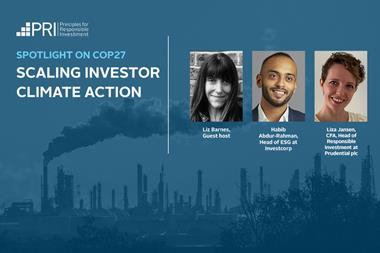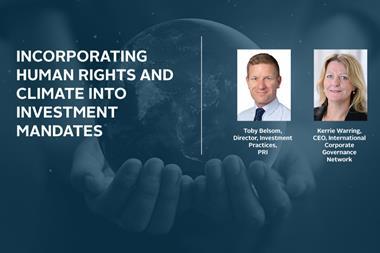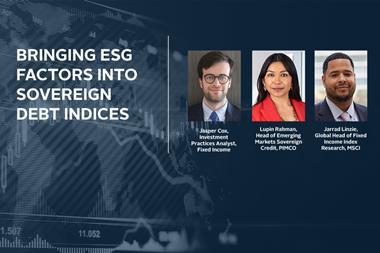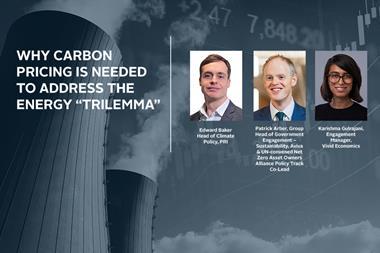In this special episode of the PRI podcast, we take stock of progress in 2022 on the climate and environment, as we discuss:
- The biggest achievements for climate and environmental action in 2022, and where we fell short.
- The importance for investors to consider climate and nature together, and their connection.
The key topics and moments where we would expect greater investor climate and nature action and policy environment.
Find transcript here
With Liz Barnes, host, Nigel Topping, UN High Level Climate Champion for UK.
Note: The Principles for Responsible Investment podcast is designed to be heard. If you are unable to do this, this transcript offers an insight into the episode.
Transcripts are generated using a combination of speech recognition software and human transcribers, and may contain the occasional error. Please check the corresponding audio before quoting in print.
Subscribe to the channel via Apple podcasts, Spotify, or wherever you listen to your podcasts.
Liz Barnes
Hello and welcome to the PRI podcast. My name is Liz Barnes, and I’m your host for this special episode on climate and biodiversity. In the final weeks of 2022, all eyes were on Sharm El Sheik, and Montreal, as the world watched to see how committed countries and the private sector are to A, delivering on the Paris agreements at COP 27 and B to adopting an ambitious global biodiversity framework at COP 15. Climate change and biodiversity loss are inextricably linked challenges, and the financial sector is critical if we’re to deliver the urgent action needed to halt and reverse biodiversity loss in the race to net zero. Today I’m joined by the former UN Climate Change high level champion Nigel Topping. Nigel, welcome.
Nigel Topping
Thank you. Good to be with you Liz.
Liz Barnes
Well, in this podcast we’ll be taking stock of both conferences and we’ll be drawing the links between climate and nature and the implications for investors for 2023. So, Nigel, first up, what were some of the biggest achievements for climate and environmental action last year?
Nigel Topping
Well, I think when most people look at COP 27, what they’ll remember is the very significant political breakthrough is the agreement to set up a loss and damage fund. So that’s the rich countries in the world acknowledging that there is uninsurable harm being suffered now by countries who did almost nothing to cause climate change. And there needs to be a mechanism to address that. Otherwise, it just keeps dragging them down development wise. And that was far from a foregone conclusion. And people like Salian Hook from Bangladesh who’s one of the real, been one of the real champions of the need for loss and damage to become a good friend. So that’s a really significant breakthrough cause it’s, there’s no money in it yet and it hasn’t been designed, but nevertheless, politically it’s been agreed and there was sort of all sorts of fears about endless liabilities and blank check books that stopping it.
Nigel Topping
So that, that’s very significant and that’s what most people would see of the actual negotiations. But of course, increasingly the climate cops are less about negotiations and more about change in, the real world. And there I think the increasing presence of private sector, industry and finance on the transition, on energy, on hydrogen, on electric vehicles was really encouraging. And the adoption by the Egyptian presidency of the Sharm El Sheik adaptation agenda, which is similarly a kind of action agenda for adaptation. So not just talking abstractly, but you know, how many millions of hectares of mangroves need to be restored? How many millions of people need to have clean cooking stoves delivered those very tangible outcomes. And, I think for this audience, very importantly, the delivery of a paper, which we commissioned million Mahmoud Egyptian champion and the two presidencies from Nick Stern and Vera Song, way called Finance for Climate Action, which lays out the full picture of just how much finance and from where we need to mobilize in emerging markets by the end of the decade. And then of course, a few weeks later, we had the Ming Cop in Montreal, bit like when we had the Santiago Cop in Madrid for COP 25. And the most important outcome there is an agreement on kind of the headline targets as some would describe that as the Paris agreement for, for biodiversity. Not, not everyone would agree with that, but I think it’s some very clear headline targets including 30 by 30 and getting to nature positive.
Liz Barnes
Well will come onto that one a little bit later on. I just wanted to sort of ask you really, we know that climate change is a key driver of biodiversity loss, but what do we actually mean for people that need a bit of clarity there? What do we actually mean by that biodiversity?
Nigel Topping
Well, we mean the richness of the mix of species basically. And of course, biodiversity loss is mainly driven by habitat destruction. So that’s particularly deforestation and development along coasts which get rid of, you know, mangroves and kelps and sort of fishing grounds. And what we know is that actually that what we call that sort of deforestation and more broadly land use change for agriculture, you know, quite a lot of the world we’ve, we’ve used upland degrade it and then move on. So, for example, there are 700 million hectares of degraded agricultural land in Africa. Right, so, and all that degraded agricultural land then is replaced by new degradation of pristine biodiversity habitats. So, it’s basically our consumption in an unsustainable way, in an agricultural model, which keeps encroaching. And that most famously through deforestation in the Amazon, largely driven around producing soybeans and farming cattle to feed those sort of very high energy and high impact lifestyles that more and more people seem to aspire to. And the interesting thing is that about a quarter of the climate emissions are caused by this destruction of habitat and modern agricultural practices, and about a third of the solutions could come from changing. So, it’s a huge lever for climate and biodiversity to address conserving what we’ve got left, restoring what’s been degraded and moving towards regenerative agriculture where we do produce food.
Liz Barnes
I mean, it’s, you know, I have written here you know, stats in front of me that deforestation accounts for around 11% of greenhouse gas emissions. Can you go a little bit further and tell us why it’s important for investors to consider climate change and nature together? Because it sounds like it’s not being considered at all.
Nigel Topping
Well, it’s been increasingly considered, but it’s, it lags a little bit on the, on the awareness around climate more boarding and, and carbon dioxide emissions specifically. I mean, it’s similar reasons really, as the world wakes up and you could argue with this coning treaty that we have woken on biodiversity to the physical limits of our ability to exploit the natural ecosystems of the earth. We will have to one way or another, internalize the externalities in the language of economists. So we’ve been getting a free ride on nature. We’ve been destroying nature and not paying for it. But, a hundred years ago, when economies are small relative to the, boundaries, the planetary boundaries, the scientists call them, it, we didn’t really notice it, but now we’ve broken some of those planetary boundaries around biodiversity and the climate.
Nigel Topping
And if we don’t get back in and the costs just go up and up and up, and we’re seeing that now, whether it’s zoo, or diseases, that’s one of the, one of the implications of getting, you know, infringing more and more on limited biodiversity or, or whether it’s extreme weather events as a result of climate change. So, for investors, it’s about which company? It’s about two things. It’s one about avoiding the losses associated with being invested in assets which get degraded or devalued as these externalities get internalized in the economy. And it’s also about investing in the businesses that are providing the solutions. So, one example, right? We know that nitrogen fertilizer has huge impacts on climate change cause of the gases that are omitted as it used in agriculture. It’s also a cause of biodiversity loss because you get huge runoff of nitrogen into rivers and seas and that kills off all sorts of wildlife.
Nigel Topping
So, companies who are a moving towards green ammonia, so they’re producing ammonia with green hydrogen, they’re going to disrupt and replace all the companies providing the, the gas and the, and the so-called gray ammonia. And companies who help farmers apply ammonia much more precisely so they don’t waste it and it doesn’t run off. So are going to win. So, avoiding the big losses and picking the winners is what investors’ job is. And both those things are being driven very fast by this awareness of and facts on the ground as a result of biodiversity loss.
Liz Barnes
I wanted to bring you back to you mentioned the Montreal global biodiversity framework. One of the main calls of the lead up to the conference was the 30 by 30 pledge, which means protecting 30% of the world’s land and seas for nature by 2030. And the entire COP 15 outcome document that coming Montreal Global by diversity framework consists of 23 final targets, including 30/30. What are your thoughts on the overall COP 15 outcome?
Nigel Topping
Well, I think that, I mean, 30/30 it says it’s really important. It’s simple, everyone can remember it, it’s easy to conceptualize. I mean, most people won’t, won’t be familiar with the other 25 targets. And similarly, you know, Paris Climate Agreement delivered a lot, but what people remember is the commitment to get to net zero. And that’s been the real focus. And so, it’s not the, I think that’s the head that headline is, really important. I think what we can now do is really just focus on implementation. And that’s, and that really important thing is that, for example, any country can say that they’re going to protect 30% of land and ocean, but it costs money to do that, right? So, this is why I think the financial sector’s so important is you can’t just wish management capabilities and resources into existence on a whim.
Nigel Topping
So, we have to start looking at what are the sustainable financial models, particularly for those predominantly emerging and developing countries where most of the rich biodiversity in the world remains. You know, we can’t just expect them to develop by not developing those natural resources. So, which is, which is why things like looking at the very high levels of indebtedness of some of those countries and looking at smart debt for climate or debt for nature swaps, you know, we’ve just seen Portugal do one with Cape Verde where they in exchange for a, for a deal is done where writing off a significant amount of the sovereign debt in exchange for some of the money that would’ve gone to repaying the debt instead going into managing that biodiversity or carbon markets. Very controversial. But if we don’t find a way to pay people to look after natural capital, then they will destroy it for an alternative economic gain. So, finance is absolutely the heart of how we make this transition. We there has to be a finance model which makes it more valuable for a country to maintain its natural capital than to, than to cut it down or to pollute it.
Liz Barnes
And what you were just saying there, there about Portugal and Cape Verde, is that a good example of how it can of how it can actually work successfully?
Nigel Topping
Yeah, because we’ve now seen that we’ve got a few examples of the Seychelles and Belize and Cape Verde of small highly indebted countries entering into these kind of agreements with the providers of debt to take a haircut on the debt, but with something in exchange, which is a commitment. So, we’re going to need to see more of that. In fact, one of the, one of the papers that I mentioned that was delivered to COP by Nick Stern and Vera Song, which we, the champions in the presidency is commissioned, does talk about both the amount of money that’s needed for nature-based solutions, but also some of the big barriers that we have to tackle indebtedness. And because that’s a barrier to countries being able to invest in their own natural capital. If they’re, spending most of their limited financial resources, repaying debts and paying and paying high levels of interest.
Liz Barnes
Looking back on, on 2022, this is quite a big question, I suppose, where do you think we fell short in climate and environmental action as a whole?
Nigel Topping
So, we are massively falling short of what we need to do. And, you know, we’re at 20 years too late and the scientists are very clear that we’re approaching tipping points where things could run away. Like we could, you know, we could, things don’t happen in a straight line. Sometimes you get to a point where it’s like triggering an avalanche, a snow slope appears completely stable until one flake of snow or one skier or one climber triggers a whole slope to collapse. And so, this idea of tipping points is well established in the earth system, and we could be triggering those in the Amazon, in the Greenland ice cap in the, in the overturning circulation of saltwater and freshwater in the North Atlantic. So, we’re in very dangerous territory. On the other hand, the, the pace of change to address the problem is accelerating.
Nigel Topping
So, it is a tale of two stories and if you just look at the snapshot, and my colleague Gonzalo, the Chilean high-level champions used to say, you need to look at the movie, not just the still because the still is really scary, right? So, you do need to look at, you need to know how bad things are. But actually we’re, you know, we’re, we’re doubling the deployment of electric vehicles. We’ve gone to a trillion dollars now of per year of, of renewable energy. 90% of all, all the electricity supply in the next five years is going be renewable. So, you know, green hydrogen is taking off all sorts. So, all sorts of tracks taking off the, the area that is definitely further behind it is, is nature, right? And a lot of this is because it’s, it’s more complicated.
Nigel Topping
It’s very fragmented. Land ownership, it’s very political, you know, farming’s always been political. Sometimes we’re talking about changing farming practices with millions, millions of farmers and millions of votes. So overall we’re not doing nearly enough. But we’ve now got very clear North star and climate and increasingly clear action tracks and increasingly mobilization around them. And now we’ve got the North star that’s been internationally agreed for biodiversity. What we really need to do is much more quickly get mobilized around the action tracks to close the gap as quickly as possible.
Liz Barnes
But I think as you said, like trying to, trying to, it’s changing hearts and minds really, I suppose with, with in a way, isn’t it? With, with farming practices you know, you can, you can put in levels of, you know, you mentioned things like electric vehicles. You can put in stats for that, but physically getting people to change how they do staff so much more difficult because you’ve got so many millions of people who maybe can’t change or don’t want to change for various reasons.
Nigel Topping
Well, this is why, you know, economic incentives really matter. There’s a, there is a huge sort of global shift towards vegetarianism going on that’s partly driven by awareness of the damage that eating extensively farmed meat causes them biodiversity and climate. But yeah, ultimately you need to look at the economic incentives. There’s a beautiful little video called 30 Harvest by the American farmers and ranches for action, which basically is about a three minute video, recommend it to anyone, you just Google it. It basically tells a story from a farmer’s perspective that they know there’s only 30 harvests left because we’re depleting the top soil, because we as society have kind of forced farmers to behave in a certain way by rewarding a certain product, which is lower and lower quality from a perspective of health and, and from perspective of biodiversity.
Nigel Topping
But because we’ve been driving low cost as though that was anything that mattered. And what that leads to is, you know, monocultures, obesity, farmer suicides, you know, all sorts of, you know, depleted biodiversity. So, in climate change, someone like John Holland and Kaye the CEO of Heathrow airport says, we have to pay more for flying again. The cheap, cheap, cheap, cheap, cheap has become the, you know, the quantitative has become more important than the qualitative. So, some things we’ll have to pay more for because we have to pay for the damage that is caused. That’s the problem ultimately is that we’ve just been extracting value from nature and not paying for it. But it’s a, it is a form of capital that, and it is limited and, and it will hit these tipping point limits when it will collapse if we’re not careful.
Nigel Topping
So, I think that farmers will respond to economic signals. So, where we have, like in Costa Rica where there’s, you know, a well-established price for standing forestry, there’s very high levels of standing forestry because those people who own it are paid to maintain a standing forestry. So it’s not, you know, behaviour change is contextual. It’s about what we know, but it’s also about what we value. This, this is why I think the, the whole argument about offsets, which is often dominated our rather puritan and privileged northern elite that worry about possible and real problems in offsets and doesn’t pay enough attention to the very strong voice you hear from the global south saying, please can we make these markets work? Cause it’s one of the few ways we can see of finance flying from the rich north to the developing global south. And if we just turn that off, on a puritan justification because things might go wrong, then we turn off a potentially a really important flow of capital to the global south and then we then we just exacerbate this bifurcation between developed and development countries.
Liz Barnes
I want to sort of gaze into a bit of a crystal ball and look ahead to 2023 after listening to, you know, listening to what you just said. There’s so much, so much there to think about what are I suppose the key moments and topics where we’d expect greater investor climate and nature action and policy development. What can we expect in those areas?
Nigel Topping
Well, I think there’s actually quite well-established private sector tracks for decarbonization of industry and energy. Now we know what we’ve got to do. We know the technologies in capital are starting to be deployed at scale. And so, investors are, you know, generally are looking quite seriously at renewable energy storage grid infrastructure, electric vehicles charging green hydrogen and, and the, and the sustainable aviation field and sustainable shipping is starting to take off. And those I think will be very strongly pushed by the Emirati presidency of COP 28. And I think that COP will be much more about bringing evidence of capital commitments and deals having been done to the, to the table. That’s been the trend, but I think this presidency’s will be very focused on that. The, the thing that is going to be really interesting, I think this year will be the possible and hopeful developments in the international finance architecture, particularly with the summit that President Macron and Prime Minister Motley from Barbados are convening in Paris in June with expectations that reviews of the provision and leverage of finance by the multilateral banks make some real progress this year.
Nigel Topping
Because one of the most significant findings of the stern software report that I mentioned is that we need 2.4 trillion a year in emerging markets across, you know, energy, nature and agriculture and then adaptation and resilience and loss and damage. And that is going to require everybody to invest more. And importantly it is an investment, right? Because then the, the economy that emerges after that is a much better economy than we’ve got the one we’ve got now, or the one that we would’ve if we didn’t, if we didn’t act. So, I think that that, that the spring meetings in April and then the, macro Notley summit in June are going to be really interesting. And then of course there’ll be the, the Secretary General’s is going to be making the September UN general assembly moment very focused on climate change again before the Emirates in COP. And, and hopefully the presence of nature will continue to grow in that COP context. I mean there’s a lot of people working on water, on oceans and on solutions driving those very specific action tracks that I talked about earlier who were there in COP and I think that’d be even stronger this year.
Liz Barnes
Nigel, just before we go, I wanted to ask you one final question. Now that you’ve handed over the baton as the high-level champion after the past two years, do you have any final thoughts or words for us?
Nigel Topping
Well, I think we need to really be in implementation mode and I think there are real limitations to what a consensus based negotiating process can deliver for that. That’s why the parties, the countries created this sort of feel like parallel track, which I, was involved in for the last few years and been really interesting for me to see how that evolves from presidency to presidency. So Gonzal Munos, who was I worked with from Chile really was the first person from a private sector background and really said, look, we have to be very clear about what, what are we actually trying to do here? Let’s publish pathways for every sector. He and I then launched a couple of campaigns to really try and get as many people as possible to say, no, we are committed to net zero and the Race to Zero. We are committed to addressing the vulnerability and of lives and livelihoods and the race of resilience.
Nigel Topping
And then with Mark Carne, we launched the Glasgow Financial Alliance for net zero. And then we then and then we launched the breakthroughs, which is a set of very specific things that need to happen, like 170 million tons of green steel, 15% of sustained aviation fuel, et cetera by 2030. And in Sharm El Sheikh, we did the same with the Egyptians for the Sharm El Sheikh adaptation agenda. So we kind of have, and then, and then this paper from Stern and Song wait, which I think needs to be now built into an action agenda for finance. Like what are the 15 things that need to happen from MDB reform and changes in the debt architecture and increasing insurance coverage for the vulnerable, things like that. So, it’s needs to be brutally about implementation and those going to COPs need to be going with what they’re doing to ramp up the speed of implementation across whatever tracks their business model or their community or their country is involved in. And I, and I think that is happening, you know, the, the Chileans that a bit of that in Madrid there’s a lot more of that public private ambition, mainly in Glasgow there’s more evidence of implementation in Sharm El Sheikh. I think there’ll be a real focus on implementation in the UAE in November, and I think from every, COP since then because it’s all about how do we just learn and accelerate to get back on track to net zero in the 2040s.
Liz Barnes
And, you know, in terms of two years ago when you started, do you think we are going where we need to be going?
Nigel Topping
Well, I think it’s an important question because this year of course it’s formally the year of the global stock take and most people are already saying, we know what it’ll say. It’ll say that we’re, you know, we’re, we’re failing. It’s a complete disaster. And because, and at one level that’s true, right? We, we’re running out of carbon budget, we’ve, you know, we haven’t bent the curve, but I think if you look at some of the leading indicators of how quickly things are changing, I think you can be more positive. And I think that it’s also important that we see that there is, there is, you know, we are amazing when we finally decide to do something about things, right? We, we have huge resources, huge ingenuity, and we basically all agreed, now we have to get to zero as quickly as possible.
Nigel Topping
And money is piling in and more needs to pile in and more needs to pile in in countries where it hasn’t necessarily gone before. Most of the infrastructure in the next thirties is all going to be built in in emerging and developing countries. So, if major investors aren’t leaning into those countries and rolling their sleeves up and helping problem solve to get the cost of capital down to make things investible, then they’ll lose out and the, and the world will lose out. So, I think that it’s a tale of two stories, as I say, we’re way off track and we are learning and going exponentially faster and it’s that exponential growth in the adoption of the solutions that we know are needed that we really need to focus on, not just beat ourselves up. I mean, there’s not, there’s no agency in saying how bad we are and it’s something I worry a bit about.
Nigel Topping
I’ll just end with an anecdote. I, led a workshop in the Emirates last year with young climate leaders, many of them, many of them young Arab women, and they, and, and we did a little workshop on what they can do. And one of the things I asked them to do as a little exercise was get in touch with their emotional response to climate change. What did climate change make them feel? Angry, sad, excited, frustrated, whatever. So, the next day, one of these young women was asked to give a closing remark at a long workshop with the Italian business where they’d be presenting all the things they’re doing, people like Elle, who are doing amazing stuff in the renewables. And she said at the end, she said, you know, Mr.Nigel asked us to talk about our emotions.
Nigel Topping
So, and I have two emotional responses from what I’ve just heard. First of all, I’m really excited as a young person to hear about all the amazing things that you are doing. Second of all, I’m really angry that no one’s telling us about this. So, I think, I think we’ve got a real job to do, to communicate all the amazing things that are being done because that attracts energy and encourages people to go further and faster. Not, to be dishonest about how bad things are and the risks we face, but if we want agency and we want people to lean in and help, they also need to know that there’s lots of people doing good stuff and it’s going faster and faster. And the more people do it, the more chance we have of getting on track.
Liz Barnes
Nigel, it’s been an absolute pleasure to talk to you today. And I just want to also say thank you for your insights and for the way you’ve explained everything. It’s, it’s been interesting to listen to you and to have these, you know, to have this conversation. If you like this episode, please do rate and follow the PRI podcast. And for more information on responsible investment, please go to unpri.org. Nigel Topping, thank you very much indeed.
Nigel Topping
Thanks. Liz,
Downloads
Spotlight on Climate & Environment: Transcript
PDF, Size 0.19 mb



















